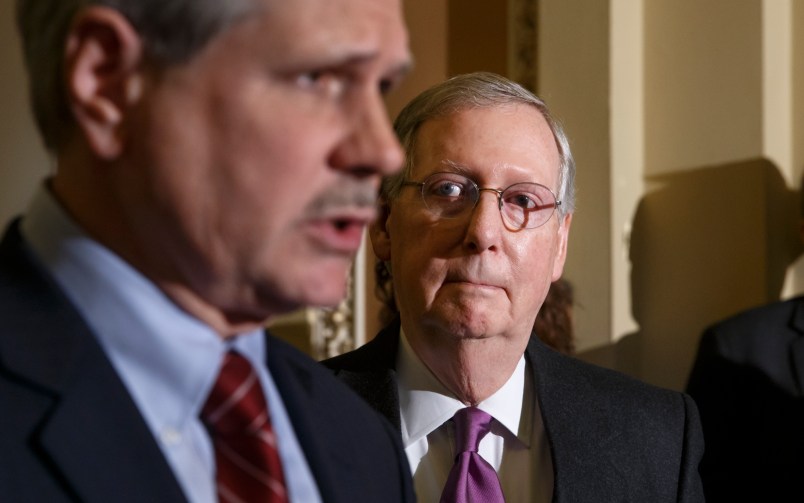WASHINGTON (AP) — The Republican-controlled Congress is set to send a bill approving the Keystone XL oil pipeline to President Barack Obama, who has vowed to veto it.
The House is expected to pass the bill easily Wednesday afternoon, capping weeks of debate over one of Republicans’ top priorities — a bill authorizing the construction of the much-delayed pipeline. Yet support in both the Senate and House has not been enough to override a veto.
The pipeline has exposed larger divisions between environmentalists concerned about global warming and potential oil spills against supporters who argue that the $8 billion project will create jobs and boost U.S. energy security. One of the measures added to the bill by the Senate states that climate change is not a hoax, which could make some conservative Republicans think twice.
The pipeline is the first of many standoffs expected between Obama and Republicans on energy and environment.
As the House prepared to vote on the bill, the Senate environment panel on Wednesday planned to hold its first hearing examining the Obama administration’s plans to curb heat-trapping carbon dioxide from power plants. The initiative is the cornerstone of Obama’s efforts to curb global warming.
The House is expected to unveil a larger energy bill next week.
Obama has rejected previous attempts to force his hand on the Keystone XL pipeline, saying he wanted the review process to play out and to ensure the pipeline wouldn’t exacerbate global warming.
While the State Department’s January 2014 analysis said Canada’s tar sands would be developed regardless of whether the pipeline was approved — meaning the pipeline itself would not increase greenhouse gas emissions — the Environmental Protection Agency has said that analysis needs to be revisited because of lower oil prices.
Sen. John Hoeven of North Dakota, the chief Republican sponsor of the bill in the Senate, urged the president to approve the project. The pipeline would carry oil harvested from Canada’s tar sands to Nebraska, where it would connect with existing pipelines to refineries along the Texas Gulf Coast.
The pipeline would also carry some of the oil from North Dakota’s oil boom.
“The president needs to work with Congress in a bipartisan way and approve the Keystone XL pipeline project for the American people,” Hoeven said.
___
Follow Dina Cappiello on Twitter at http://www.twitter.com/dinacappiello
Copyright 2015 The Associated Press. All rights reserved. This material may not be published, broadcast, rewritten or redistributed.







I’m curious - if the President vetoes the bill, will the Republicans pass it 50+ times, just to make some sort of point, as they have with trying to repeal the ACA?
Since the U.S. is currently producing more oil and gas than ever and we’re currently wallowing in excess supply, and since the tar sands are going to brought to market regardless of the pipeline, the energy security argument argument for Keystone is moot.
That means the only real argument in favor of 850 miles of pipeline being built is for the jobs it would create, which proponents have vastly overstated. And, according to a report recently released by the Center for American Progress, proximity to open spaces and outdoor recreation areas are a much better enticement to job growth than oil and gas development.
The outdoor recreation industry currently supports 6.1 million jobs in the United States. U.S. outdoor recreation accounts for more direct jobs than oil, natural gas, and mining combined, and a growing body of research shows that proximity to parks, trails, and outdoor spaces is among the most prominent factors that businesses and workers consider when choosing where to locate.
A 2012 Headwaters Economics study found that areas in the West with protected public lands have higher rates of job growth and that proximity to the protected land is “correlated with higher levels of per capita income.” Areas with national parks, wilderness, and other recreational assets are succeeding in attracting high-wage, high-skill jobs more rapidly than similar communities without such amenities. “Communities with protected public lands have a competitive advantage in attracting the engineers, architects, software developers, doctors, lawyers, researchers, and others,” study author Ray Rasker recently wrote in the Missoulian.
A 2011 California study notes that quality-of-life benefits associated with recreational opportunities and infrastructure—in terms of keeping people healthy, attracting workers, and attracting employers—could be a state economic contributor that is at least as important as the direct sale of outdoor products and services.
So, instead of building a pipeline with minimal job creation potential, with no real contribution to U.S. energy needs and with very serious environmental hazards maybe we should think about building a bike path instead.
http://www.americanprogress.org/issues/green/report/2015/01/21/103062/the-government-should-begin-to-measure-americas-powerful-outdoor-economy/